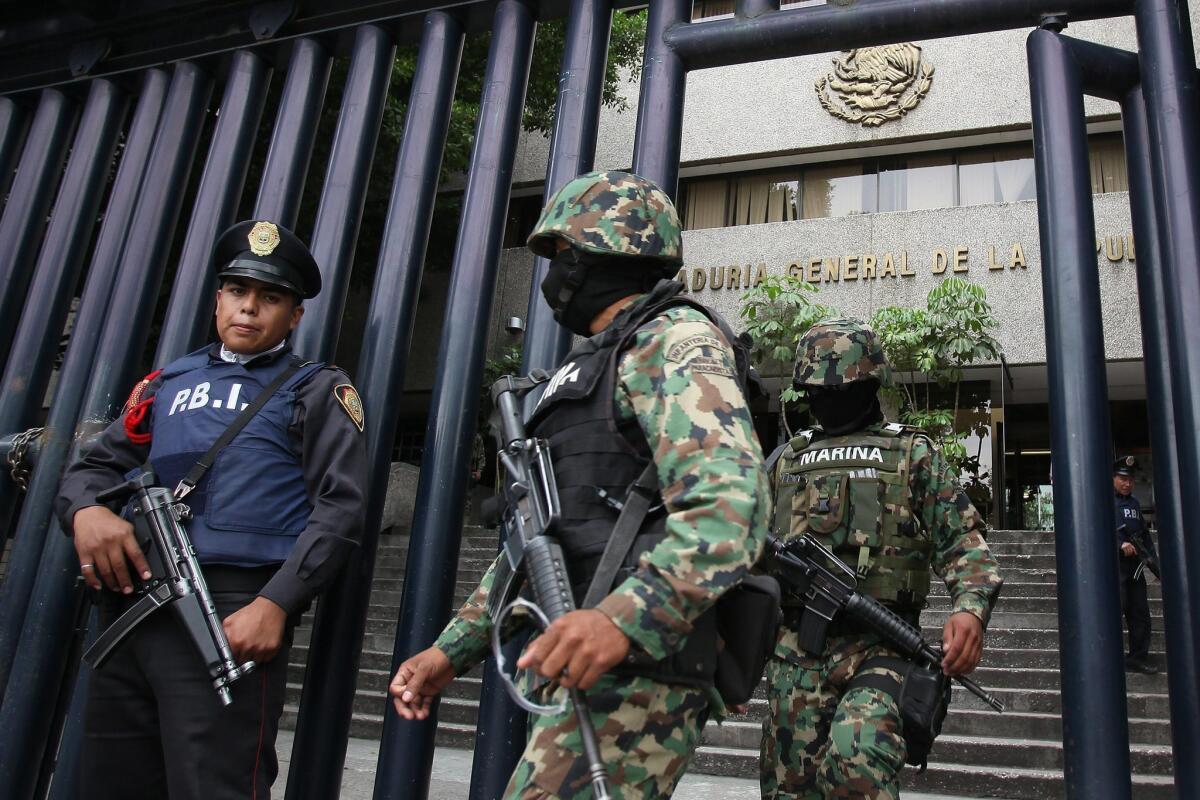Mexico’s ‘new’ drug war

- Share via
Last week, Mexican authorities arrested Miguel Angel Treviño Morales, the leader of the Zetas, Mexico’s deadliest and most feared drug cartel. In Mexico, the news was met with relief, although there is also apprehension that his arrest will lead to a convulsion of violence; historically, taking out cartel kingpins has meant power struggles within organized crime groups, schisms that leave many dead in their wake.
Treviño Morales, known as Z-40, was apprehended — along with a bodyguard and a third man, reported to be the cartel’s accountant — without a shot being fired as he traveled along a back road near Nuevo Laredo and the U.S. border.
For observers of the Mexican drug war, his arrest provides an unanticipated window into how President Enrique Peña Nieto will address his nation’s entrenched organized crime problem.
FULL COVERAGE: Mexico’s drug war
From the beginning of his presidential campaign, Peña Nieto, who assumed office in December 2012, vowed a different approach to the drug war from that of his predecessor, Felipe Calderon. Calderon’s frontal assault, though initially popular, very soon became the object of criticism as violence soared. Last summer, the electorate handed Peña Nieto a decisive victory over Calderon’s party, the PAN. Having suffered about 70,000 deaths (a conservative estimate) over the course of Calderon’s presidency, the country was exhausted by the violence, anxious for change.
Calderon pursued a kingpin strategy: Drawing from American counterinsurgency tactics developed in Iraq, his administration declared war on a list of 37 most-wanted cartel operatives. In contrast, many Mexicans believed Peña Nieto would negotiate a peace agreement with the cartels, allowing them free rein in exchange for ending the violence. In addition, Peña Nieto signaled that he might be reevaluating Mexico’s close cooperation with American law enforcement in the drug war.
The arrest of Z-40 would seem to prove those notions wrong. Within days, the national director of Calderon’s party accused Peña Nieto of disingenuously building expectations of a new approach when, for all practical purposes, he was continuing Calderon’s tactics. Indeed, the arrest had all the familiar hallmarks: Treviño Morales’ moves were tracked in real time by a U.S. Immigration and Customs Enforcement drone, while American intelligence monitored his communications and shared what was learned with Mexican authorities.
Pragmatism may be one explanation for Peña Nieto’s decision not to jettison the kingpin strategy altogether. His administration simply could not ignore that Mexico’s drug cartels are criminal organizations that not only operate an international drug trade but also commit brutal acts against ordinary Mexican citizens on a daily basis, including kidnapping, human trafficking and extortion — on a massive level — of individuals and businesses. The Zetas, in particular, are infamous for having a “diversified business plan” when it comes to criminal activity.
For Peña Nieto — and Mexicans tired of the violence created by the government crackdown — it is one thing to entertain a live-and-let-live strategy toward the cartels when their primary activities are understood to revolve around servicing the high demand for drugs in the U.S. However, that strategy is no solution if Mexicans continue to be victimized in the absence of government protection in their communities.
It is also likely that Peña Nieto was presented with a politically awkward choice vis-a-vis the United States. The Mexican president apparently faced incontrovertible evidence from U.S. sources indicating that the head of Mexico’s most feared cartel was, literally, in their sights. To have not acted on that intelligence would have certainly raised speculation that the Peña Nieto government was protecting Z-40, which wouldn’t have played well at home or helped in negotiating a new relationship with Washington.
Still, it would be a mistake for Peña Nieto to simply pick up where Calderon left off. The previous administration overemphasized a militarized law enforcement strategy, only belatedly looking at the social conditions that helped create a culture that allowed the cartels to thrive (lessons important in tamping down cartel violence in Colombia and Brazil).
That said, the kingpin strategy is not going to go away. There is no sign that the U.S. will end its intelligence work in Mexico, with or without overt cooperation from Mexican authorities, and the U.S. will undoubtedly continue to exert pressure on those officials to act on that intelligence. But so will everyday Mexicans, with their sometimes conflicting needs for peace and protection. In Mexico’s budding if imperfect democracy, the latter pressures can no longer be ignored.
Ricardo Ainslie, a native of Mexico City, is the author of “The Fight to Save Juárez: Life in the Heart of Mexico’s Drug War.” He is a psychoanalyst and a professor of education at the University of Texas at Austin.
More to Read
A cure for the common opinion
Get thought-provoking perspectives with our weekly newsletter.
You may occasionally receive promotional content from the Los Angeles Times.










